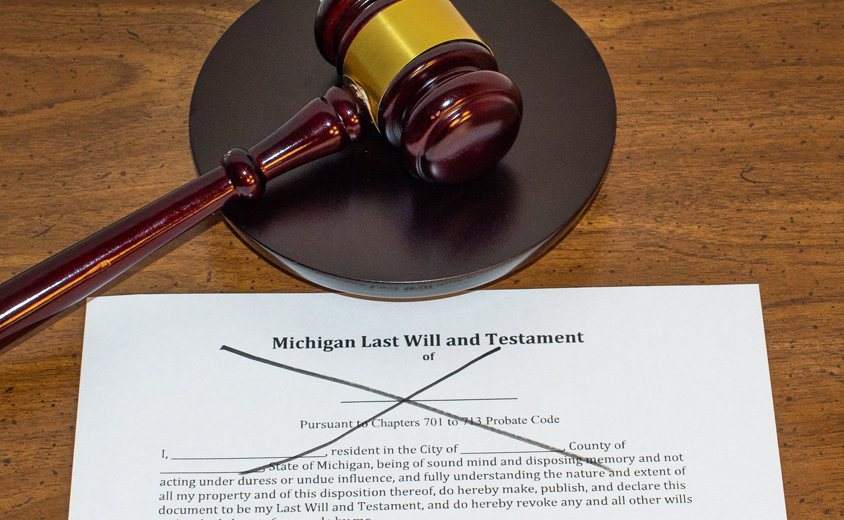Intestate succession occurs when a person dies without a written, legal document detailing how to distribute their property and assets. If a decedent passes away without a will or trust in place the estate usually goes through Probate Court.
This process is both lengthy and expensive so it’s important to obtain legal council when a family member passes away without an estate plan.
Each state has their own individual process to determine who inherits assets. This page focuses on intestate succession in the State of Michigan.
Michigan’s Laws on Dying Without a Will
As previously discussed, Michigan has its own legal process in determining who receives assets should someone pass away without an estate plan.
Michigan Laws are complicated regarding complex family matters involving children and inheritance. The Michigan Legislature lists these laws under Michigan Compiled Laws 700.2108 and 700.2114.
To illustrate this complexity, here’s an excerpt from the Michigan Legal Code regarding adopted children and inheritance.
“An adopted individual is the child of his or her adoptive parent or parents and not of his or her natural parents, but adoption of a child by the spouse of either natural parent has no effect on either the relationship between the child and that natural parent or the right of the child or a descendant of the child to inherit from or through the other natural parent. An individual is considered to be adopted for purposes of this subsection when a court of competent jurisdiction enters an interlocutory decree of adoption that is not vacated or reversed.” (Michigan Legislature Section 700.2114, 1998, 700.2114 Parent and child relationship).”

Frequently Asked Questions
Do All Assets Go Through Intestate Succession?
Some assets may avoid Probate Court when a person passes away without a will or trust. For example, any property you own with another person passes to that person upon your death. Other valuable assets not affected by Probate Court include:
- Life insurance
- 401K, IRA, or other retirement accounts
- POD bank accounts
- Joint bank accounts
- Securities in a transfer-on-death account
Basically, anything with a named beneficiary is safe from Probate Court and will pass to heirs when they produce a death certificate.
Does a Spouse Inherit Everything Without a Will or Trust?
Michigan Intestate Succession only applies to property or any part of an estate that is not held jointly by a married couple. For example, if a married couple jointly own a home and one spouse passes away, the home now belongs to the surviving spouse. However, if the home was only in the name of the deceased spouse and there is no will or trust, the courts will decide what happens to the home’s equity. Similarly, if the deceased person owned any property or had a bank account in their own name the proceeds go to any named beneficiaries.
These beneficiaries may or may not be the spouse. When no beneficiaries are named, Probate Court will decide how to divide proceeds of any property or bank account. So, it’s very important to name beneficiaries and set up a will or trust with an experienced attorney.
How Do Probate Courts Split Up Assets?
Intestate Succession is quite complicated and varies from state to state. In Michigan, there are set rules and mathematical formulas which determine how estates are divided among heirs. Probate Court divides your intestate property based on whether you have a surviving spouse, children, parents, or other relatives.
If you are married and have no children or parents, your spouse gets everything. If you are married and have children, or living parents, they will receive a portion of your estate. If you are unmarried and have no children, your parents inherit everything. If you are unmarried, have no children and your parents are deceased, your siblings inherit everything.
Which Children May Receive an Intestate Share?
Michigan law is complicated on this issue. Basically, for a child to inherit under intestate law, they must be legally your child. The following may help clear up this issue.
- Foster children may not inherit as they are not legally your children.
- Adopted children are legally your children and will inherit.
- Any biological child is legally entitled to inherit.
- Any child born to your wife during your marriage will inherit.
- A child you placed up for adoption may not inherit unless your wife later adopts them (very complicated).
- Grandchildren may inherit if their parent is deceased.
Attorney for Intestate Succession
Probate Court is the court that’s used to determine who receives assets when a family member passes away. Also, if a will or trust is contested the matter may also go to Probate Court.
A probate attorney specializes in understanding this court and its processes. If you or someone you have issues related to inheritance or probate in Michigan, contact our offices today.
